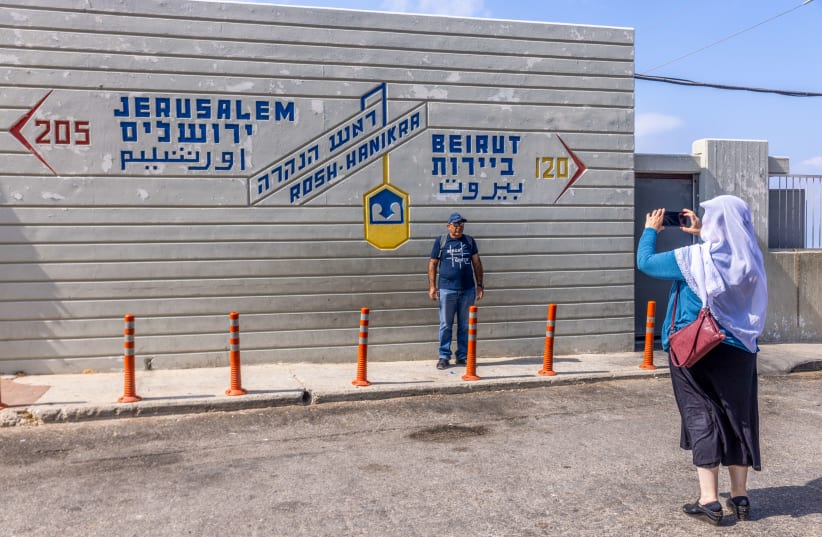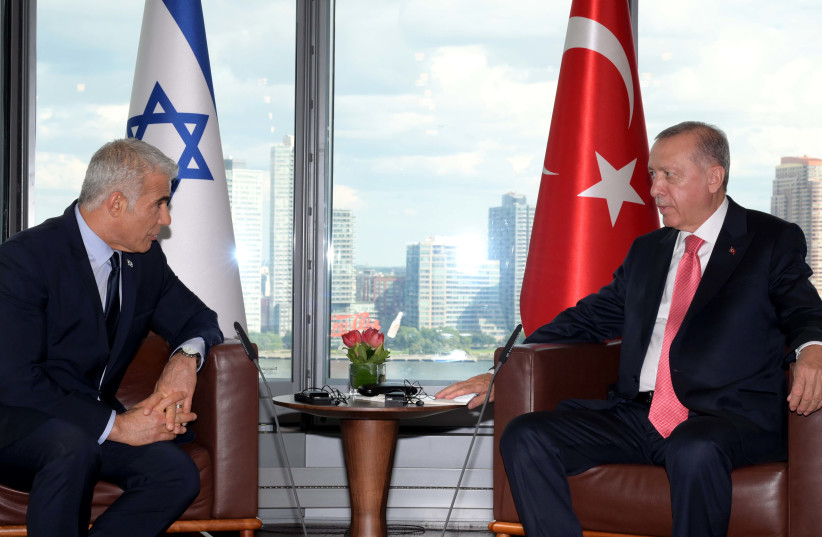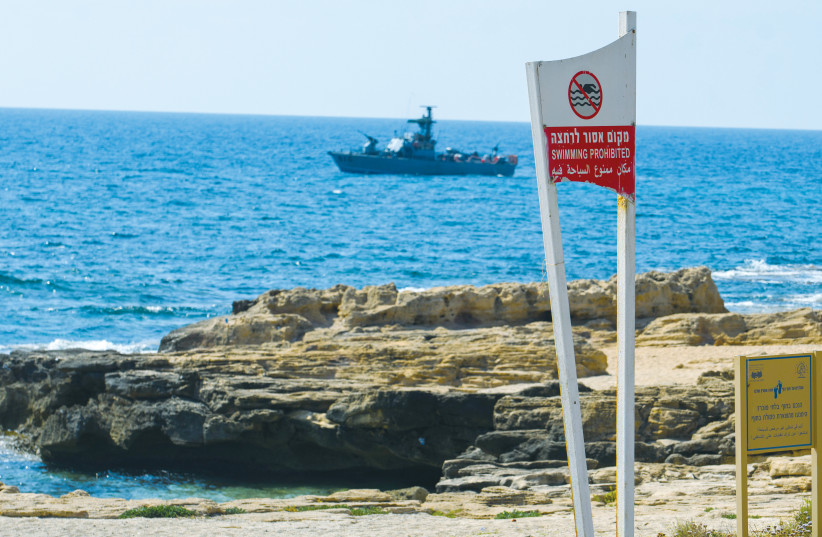Israeli leaders score two diplomatic coupse this week: the signing of the maritime agreement with Lebanon and Defense Minister Benny Gantz’s trip to Turkey.
These two events mark important turning points in Israel’s relations. The maritime agreement should ostensibly reduce tensions in the North and enable Israel to extract energy resources, while Lebanon may open up exploration off the coast to companies and investors linked to other countries, including France and Qatar.
Gantz’s trip to Turkey is part of a year-long reconciliation project between Jerusalem and Ankara. It is not yet clear what the fruits of that shift in policy will be.
Israel seeks to improve relations across Meditarranean
Turkey has become isolated after threatening most of its neighbors and many countries in the region. These include Greece, Cyprus, Egypt, the UAE, Iraq, Armenia and others. Ankara has also invaded Syria, attacked Kurds and prodded Azerbaijan to heighten tensions with Armenia. In addition, it has gotten involved in a grain deal amid the Russia-Ukraine war and offered to be an energy hub for Russia.
For Ankara, this is a good policy: muscular diplomacy in which the NATO-member country uses threats to achieve its goals. For instance, Turkey threatened to keep Finland and Sweden, two democracies, from joining the defense alliance. Meanwhile, its authoritarianism grows with attacks on media and free speech.
Turkey has also used threats against Israel to achieve its goals. Ankara’s leadership has compared Israel to Nazi Germany, emboldened extremists and detained tourists, while backing Hamas terrorists. Now, Ankara appears to be shifting course, wanting closer ties with the Jewish state. It’s not clear whether those ties are merely part of a short-term agenda to win favors in Washington, or whether Turkey will actually change its rhetoric.
FOR ISRAEL, the goal is to improve relations in the Middle East. The Abraham Accords have given the Jewish state a major shift in its relative position: from an isolated country to one that is a potential center of regional relationships. The next summit between Israel, Bahrain, Morocco, UAE, Egypt and Jordan is scheduled for January in Morocco.
Israeli government got major diplomatic accomplishments
Israel’s current government sought to improve ties through public meetings as well as through trips by Gantz, President Isaac Herzog, Prime Minister Yair Lapid and former prime minister Naftali Bennett. In fact, the current leadership appears to have had more major public meetings with countries, from the Gulf to Morocco and Azerbaijan, in just a year, than the administration of Benjamin Netanyahu did in ten.
That is a major accomplishment; the question is whether it will have tangible results and whether Israel can juggle the concerns of different countries in the region.
These warming regional ties can be seen in the defense tech arena. Israel Aerospace Industries (IAI) will display at the Bahrain International Air Show in November. IAI says it will showcase a variety of its “state-of-the-art aviation products, including civil aviation, radars and avionics, air defense systems, coast guard and drone guard systems. This is the first time that an Israeli company is participating in the event.”
WHEN IT comes to common threats, Israel’s main concern is Iran. Iran-Russia ties relating to drones could increase Russian support for Iranian defense technology sectors. It’s not clear how this may impact Iran’s and Russia’s role in Syria on Israel’s border.
It’s also not clear if the maritime deal will actually stop Hezbollah from escalating tensions. Hezbollah could use foreign investment off the coast to hide behind foreign companies exploring gas. Jerusalem would then be put in a difficult position of retaliating against Hezbollah and being seen as harming the foreign investment.
The maritime deal with Lebanon could be good for both countries, but it could also let Hezbollah off the hook and create a situation where Israel has to honor commitments to Lebanon while Beirut continues to let the terrorist group conduct illegal activities, like weapons stockpiles and using drones to threaten Israeli gas rigs.
Meanwhile, Turkey could also use better ties with Israel to try to harm Israeli ties with Greece and Cyprus. Jerusalem, Athens and Nicosia have achieved unprecedented partnerships in recent years. This resulted in defense cooperation and was also supposed to lead to the potential for an East Med pipeline.
A flight training center was announced last year between Israel and Greece; operations at the center began last week. At the time of its announcement, Gantz said that “this cooperation agreement rests on the excellence of Israel’s defense industry and the strong relations between the defense establishments of Greece and Israel… I am certain that [this program] will upgrade the capabilities and strengthen the economies of Israel and Greece and thus the partnership between our two countries will deepen on the defense, economic and political levels.”
Turkey, meanwhile, wants to position itself as an energy hub. It’s not clear if Ankara will continue to create turmoil in the region. It has concluded new defense and maritime deals with Libya and has threatened Greece in the past year. Recently, German Chancellor Olaf Scholz rejected Turkish claims to sovereignty over Greek islands, saying it was not acceptable for a NATO member like Turkey to threaten another NATO member like Greece.
Turkey uses Israel for deals in Washington
ISRAEL DOESN’T want to be involved in large disputes in the Eastern Mediterranean, but in the past Turkey has tried to use relations with Jerusalem to secure deals in Washington, and Ankara has exploited its ties with Hamas to threaten peace in the region.
It’s entirely plausible that Turkey will not only increase threats against Greece but will try to use new ties with Israel to score concessions or silence from Jerusalem. It’s clear that the West, already backing Ukraine, can’t afford a crisis with Greece.
Ankara has also blackmailed NATO, threatening to prevent northern European countries from joining while it collaborates with Russia and threatens new military attacks in Syria. Turkey has been bombing US partners in Syria, the anti-ISIS Syrian Democratic Forces, using drones to assassinate anti-ISIS fighters. At the same time, Iran is concerned about Azerbaijan-Armenia tensions, which could lead to yet another crisis in the Caucasus.
For Turkey, the world of crisis has been good; it distracts from domestic economic problems as the ruling party heads towards elections, and enables Ankara to wring concessions from the West and others to maintain the peace. By positioning itself as an energy hub and a country that works with Russia and Ukraine, Turkey can play both sides. This is how it tends to achieve goals, by working both sides: being in NATO, but also attending the SCO (Shanghai Cooperation Organization) confab in Central Asia and working with authoritarian regimes like China, Russia and Iran.
For Israel, the goal is to have positive relations with more countries. Israel already has good ties with the UAE, Bahrain, Morocco, Egypt, Greece, Cyprus, France and Azerbaijan; relations with Turkey are also important. However, as the conflict in Ukraine illustrates, Israel must always be careful not to become the center of attention, where it is then asked to increase involvement in a conflict, because Israel has enough threats on its borders and from Iran. With increasing pressure on Jerusalem to aid Kyiv militarily, there is much at stake.
In addition it appears the gas deal with Lebanon and ties with Turkey are partly driven by elections. Ankara had cold relations with Israel during the Netanyahu years and the former prime minister was always willing to slam Turkey for hosting Hamas or attacking Kurds. Netanyahu has also been critical of the Lebanon deal.
A new government in Israel or chaos after the election could shift Turkey’s priorities – and Israel may find itself in a difficult position regarding both Lebanon and the Eastern Mediterranean if tensions in any of these areas flare up.


